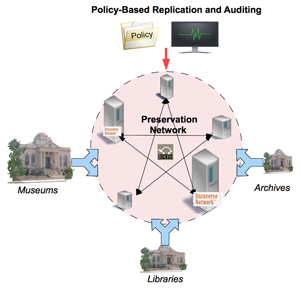May 27, 2010 -- The Institute of Museum and Library Services has generously supported members of the Data-PASS Alliance (external link) through an award to develop a policy-based archival replication system for libraries, archives and museums.
The support provides one-to-one matching funds for the $1.6 million dollar project. It is awarded under the National Leadership Grants program, which aims to advance the ability of museums and libraries to preserve culture, heritage and knowledge while enhancing learning.
 The archival community has largely recognized that a geographically – and organizationally – distributed approach is necessary to minimize long-term risks to digital materials. The new system will provide a way to ensure that replicated collections are both institutionally and geographically distributed and to allow for the development of increasingly measurable and auditable trusted repository requirements. This result will be to enable any library, museum or archive to audit its content across an existing LOCKSS network and will allow groups of collaborating institutions to automatically and verifiably replicate each others' content.
The archival community has largely recognized that a geographically – and organizationally – distributed approach is necessary to minimize long-term risks to digital materials. The new system will provide a way to ensure that replicated collections are both institutionally and geographically distributed and to allow for the development of increasingly measurable and auditable trusted repository requirements. This result will be to enable any library, museum or archive to audit its content across an existing LOCKSS network and will allow groups of collaborating institutions to automatically and verifiably replicate each others' content.
The Data-PASS partnership was established as part of a previously funded Library of Congress NDIIPP program and the replication system builds upon a prototype developed through that project.
Tools and training to facilitate the creation of archival replication policies and the auditing and management of a replication network will be released this year. We will also release extensions to the Dataverse Network System (external link) that enable curators of dataverse virtual archives to easily participate in these replication networks. These tools will be distributed as open source, and as self-contained packages for non-technical users.
For more information about the project, including publications, use-cases and code, please see the project web site (external link).
